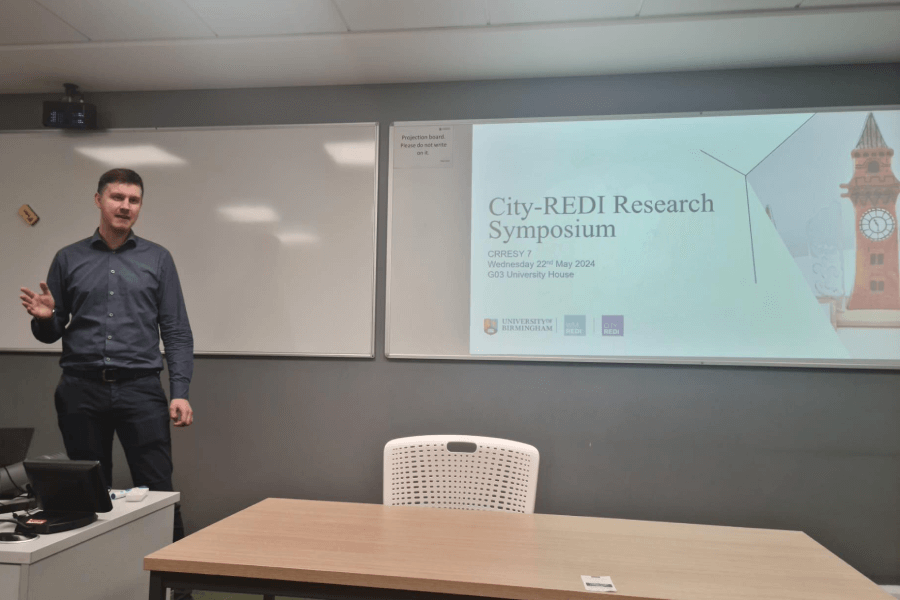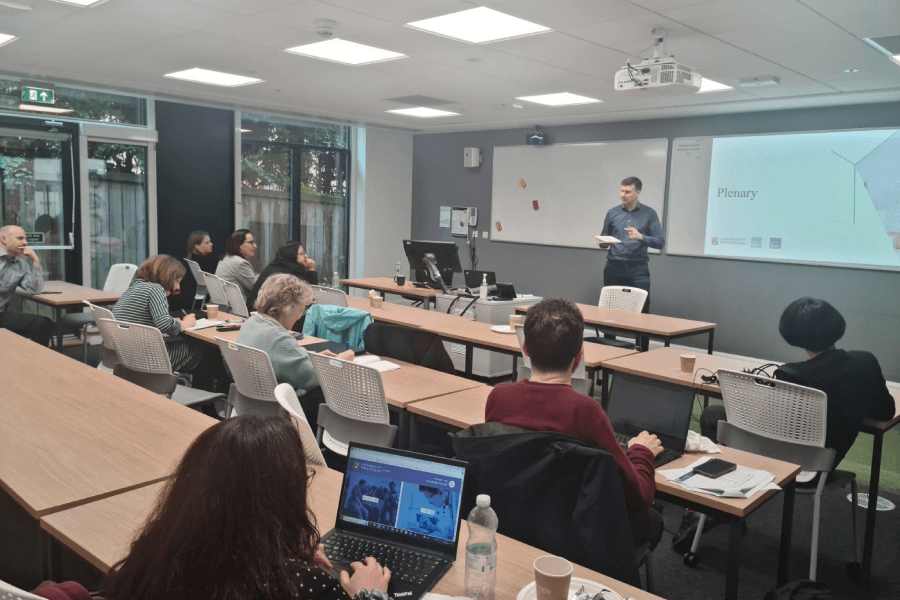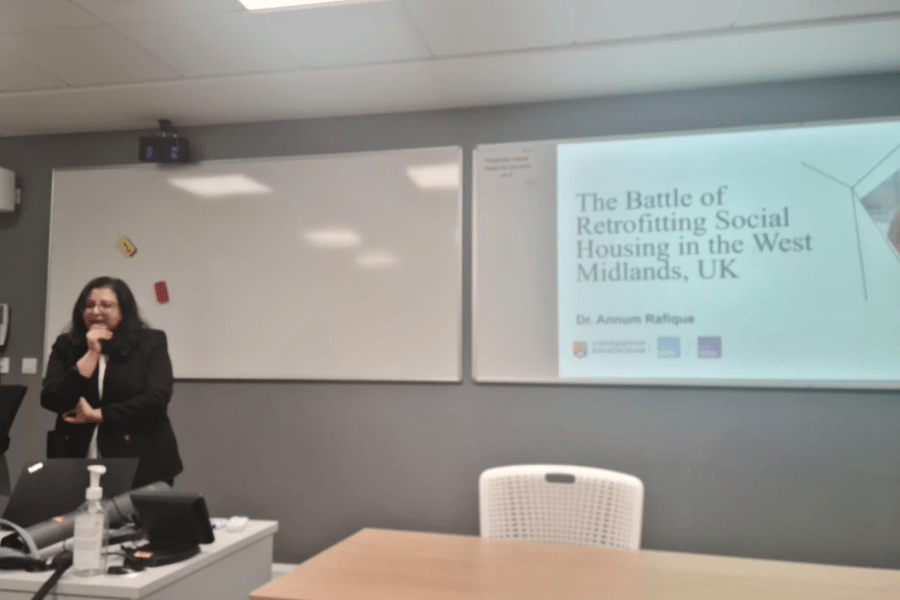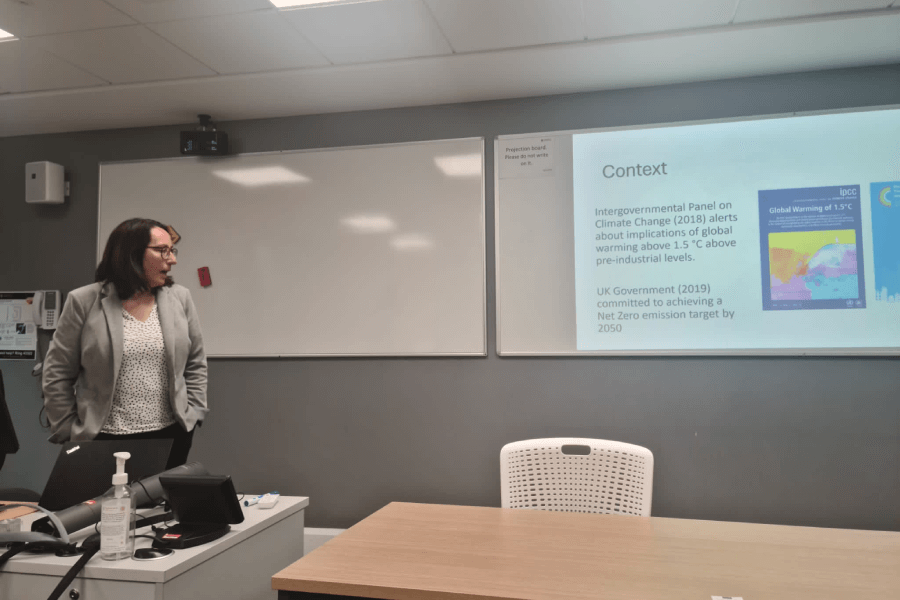
On 22nd May 2024, City-REDI hosted its seventh biannual research symposium. The in-person event featured various presentations from City-REDI researchers showcasing some of the institute’s research diversity. This blog from Hannes Read provides an overview of research from the event and his ten top takeaways. Readers are encouraged to contact the presenters for more information on their projects.
Key takeaways
The role of CRRESY
CRRESY plays an important role in helping share ideas and generating feedback within City-REDI. As a team that works in a fluid, hybrid way, being able to come together to generate these discussions is important. Talking through ideas and research projects with colleagues as critical friends can help prepare us for conference season and crystallise the concepts identified in our research.
Applying research
Research presented by City-REDI colleagues at CRRESY focused on translating learnings from research to new contexts and finding innovative perspectives, for example, from our research into transnational partnership working between Birmingham and Leipzig. Leipzig had financial issues in the 1990s, similar to what Birmingham City Council has now. Leipzig built on their strengths in media, the automotive industry and manufacturing, investing for the future and holding on to their assets. This was enabled by supportive governance structures, as well as the support of individual officers. Birmingham isn’t alone in tackling financial issues, and their twinned network with Leipzig can help learn about successful ways to move from financial precarity to economic prosperity.

Fitting in with ongoing work
Research at City-REDI tackles issues for a more inclusive and sustainable economy and society. By nature, these topics are broad and cross-cutting. As a result, City-REDI have built a network of researchers at universities, and policymakers and officers at a whole range of institutions. The discussion at CRRESY showed: the multiple synergies going on between projects; the value of talking to colleagues to share their thoughts; and using the existing network of over 25 FTEs at City-REDI to build and strengthen connections.
Findings discussed at CRRESY looked to get to the root cause of the issues
City-REDI research aims to get to the root cause of the issue, such as Dr Kostas Kollydas’ work on looking at the structural aspects that lead to inequalities in graduate drop-out rates. Even when controlling for background characteristics, there is a higher University drop-out rate for students from ethnic minority backgrounds (especially Black students). This emphasises more structural issues with access to higher education, which the research aims to address.
Practical innovations
Breaking down the big questions is a key part of presentations at CRRESY and City-REDI research. However, to make the big-scale changes needed, for example, to meet net zero targets, our research also needs to be practical and realistic. Work on retrofitting social housing and providing business support to businesses for low carbon transition are logical and implementable steps. This pragmatic approach takes the big questions around energy and net zero and turns them into something practical and possible.
The pathway to impact
Undertaking research is just one part of the pathway to impact. It takes time and energy to build meaningful relationships and networks that lead to impactful work. These relationships and networks can then be transferred from project to project to build further impact. Dr Sara Hassan presented her research journey and how she has carved a pathway to impact in each of her projects since gaining her PhD and joining City-REDI. Her engagement in participatory action research to build connections between university and society is evident throughout her research journey. From USE-IT! to Universities as Anchor Institutions, Just Anchors, and the National Civic Impact Accelerator, each project links with the other to generate a strong case for impact. Thinking about the pathway to impact is especially important as the University of Birmingham prepares to present its impact as part of the Research Excellence Framework 2029.
Abstracts

The battle of retrofitting social housing in the West Midlands, UK
Retrofitting ageing social housing for enhanced energy efficiency in the UK faces significant challenges, including funding constraints, quality assurance issues, and coordination complexities. Initiatives like those led by the local government in the West Midlands, UK, demonstrate proactive efforts to address these hurdles through innovative procurement strategies and collaborative approaches. By drawing on insights from industry reports and initiatives such as those led by the local authorities, we will shed light on these challenges and explore potential solutions, seek to empower stakeholders to overcome barriers and drive the adoption of innovative retrofitting strategies, ultimately enhancing energy efficiency and sustainability in social housing.
Unpacking Success: assessing the impact of the West Midlands Health Technology Innovation Accelerator on SMEs performance through Qualitative Comparative Analysis (QCA)
This paper sets out our approach to understanding the role of the West Midlands Health Technology Innovation Accelerator (WMHTIA) in facilitating knowledge sharing and innovation among ten SMEs as case studies taking part in the programme. Important qualitative and quantitative metrics included knowledge-sharing activities attended, projects initiated; new products/services launched, patents filed, and funding secured by participating SMEs. We created a coding scheme to systematically categorize the data from the case studies using a Qualitative Comparative Analysis (QCA) approach. QCA allows us to explore the relationships and configurations within the data that were associated with particular outcomes or conditions set at the beginning of the project.
Birmingham and Leipzig 1992-2024: insights into the challenges and opportunities for place leaders to use city twinning to address global issues
Existing studies emphasise the benefits of transborder dialogue in supporting economic development. This is increasingly important when new solutions are necessary to address global problems. Place leaders benefit significantly from learning from, and networking with, other places. This paper provides new and original insights into the challenges and opportunities for cities to use twinning relationships to address global issues.
Underpinned by relational leadership theory, the paper explores the partnership between Birmingham (UK) and Leipzig (Germany) from 1992 – 2024. The Federal German system, with its well-funded state and strong integration within the EU, contrasts with the UK’s centralised governance with a shrinking state and withdrawal from EU integration over the last decade.
We explore the influence of national/regional partnership environments on international place leadership and partnership learning/working. We consider how this has changed and the symmetric/asymmetric nature of the relationships. We examine motivations, opportunities, and barriers facing transnational twinning partnerships, discussing implications of power/resource disparities for sub-national leaders for partnerships working across geographical scales. Our findings reposition the structure as a ‘gateway’ to the agency that facilitates transnational partnerships. Despite Brexit and different governance systems, the cities are developing new cooperations.

Sustainable development and transition in business support: A case study of the UK catapult network
The objective of this study is to look at sustainable development within business support and how the transition to a low-carbon future is directly and indirectly addressed in incubation, acceleration and financial start-up provisions. The research questions are:
- How are sustainable development and transition embedded in business support?
- How can this be further enhanced?
- How many of these are sector-specific?
- How can it be applied to other sectors?
These questions are addressed in a case study of the UK Catapult Network, a network of publicly funded technology and innovation centres aiming at strengthening the UK’s capability for innovation. Data consists of policy and strategy document reviews and interviews with stakeholders within individual Catapults and businesses supported.
Initial findings suggest that business support interventions in the Catapults are expected to be ‘traditional’ and aim to help new ventures start up, scale up, and succeed in acquiring funding. In addition, some practices can be classified as innovations in support of Net Zero transition, such as spill-over effects and knowledge sharing of businesses interested in sustainable products or services, to sharing good practices in acquisition and supply chain management. Some of these are sector-specific, for example, wind turbine elements manufacturing or the maintenance of energy networks. Learning could be easily transferred to other sectors or Catapults to greatly benefit from further knowledge sharing.
Dropping out of higher education in the United Kingdom: Is ethnicity relevant?
This paper examines the variation in university dropout behaviour by ethnicity in the United Kingdom using extensive data from over a million undergraduate students for the academic years 2010/11-2014/15. For the first time in the ethnicity context, this study distinguishes between compulsory withdrawal (because of academic failure) and voluntary attrition, acknowledging that policy responses to student withdrawal should differ depending on the causes of dropout. The multinomial logit model results provide solid evidence that, on average, all ethnic minority groups (especially Black undergraduates) have a higher probability of academic failure than White students, whereas White students are more likely to quit voluntarily. Unlike previous research, this paper estimates interactive effects to show that ethnic gaps in academic failure are greater for men than for women and less pronounced at Russell Group universities relative to other institution types.
Collaborative engagement: paving the path to a fairer civic university through place-based action
Universities face mounting financial and political pressures compounded by heightened public scrutiny. Despite their strategic positioning to leverage local social and economic assets, this potential often remains untapped. However, through co-production and concerted community engagement efforts, universities, including both academic and professional staff, can actively embrace their civic and economic roles. By fostering collaborative partnerships with communities, universities can amplify their commitment to inclusivity and social and economic justice. This proactive approach extends beyond immediate benefits, aiming to secure a more equitable future for present and future generations. Embracing this ethos not only aligns with the core values of universities but also positions them as catalysts for positive societal change, enriching their impact and relevance within their communities. This paper presents three case study areas in North America, Europe and the UK showcasing universities’ efforts toward civic engagement and a stronger socially inclusive ecosystem.
This blog was written by Hannes Read, Policy and Data Analyst, City-REDI / WMREDI, University of Birmingham.
Disclaimer:
The views expressed in this analysis post are those of the author and not necessarily those of City-REDI or the University of Birmingham.
